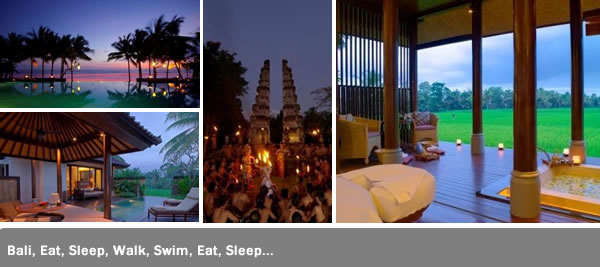Say ‘Bali’ and most people think paradise. In fact its second name is ‘The Island of the Gods’. There are stunning sunsets, sculpted rice paddies, volcanoes and temples at every turn.
An abundance of activities pervade the island; diving and cycling are popular, as is surfing. It is not unusual to find surf boards strapped to the side of mopeds, snaking through the bustling streets.
Unfortunately traffic jams are now the norm, an increase in tourism made sure of that. It shows that the terrorist bombings only slowed down Bali’s pace initially. They did little to stop the chic resorts from being built and visitors clambering to soak up the sun and the ambience the island has to offer.
The 2008 bestseller, Eat, Love, Pray or ‘that damned book’ as some Balinese like to refer to it, has bolstered tourism to an unprecedented level. Single women wonder the streets in search of spiritual guidance and perhaps a Brazilian to sweep them of their feet. Whatever your reason for visiting Bali, it is a must. It has been described as one of the most unmissable trips for 2011 by the Lonely Planet.
It tantalises the five senses, the most memorable is the lingering smell of frangipani that meanders through every aspect of Bali. Balinese Hindus use these flowers in their temple offerings and to place in the doorways of houses to ward off demonic spirits. It adds to the Islanders mysticism and ultimately, optimism.
‘The Balinese believe in everything, I’m in love with Bali, everything has its meaning’ Diah Sastri, Public Relations Manager for the GHM Hotels Bali explained. It’s easy to see why. When you arrive at the Legian Hotel in Seminyak, you are hit immediately by the sight of the crashing sea, the smell of wonderful food and the sound of traditional music that soothes the soul.
The old architecture in the lobby lures you into the false sense of being in a rumbling decrepit building, reminiscent of an Indiana Jones movie, that is until you see the rooms. The complex comprises 67 suites, all of varying designs. For more privacy the new Beach House sits in a secluded cove and comes equipped with a butler and a 16 meter infinity pool.
The Balinese petrified wood is a theme throughout and extends into the restaurant and the lobby and ocean bars, where for cigar connoisseurs, the signature ‘Legian Cigar’ comes highly recommended. You can sample the traditional Nasi Goreng dish, Indonesian fried rice with vegetables and meat. Many eat this for breakfast as well as lunch or dinner.
They say that labour is cheaper than electricity in Bali, and here you can indulge yourself in a traditional Balinese massage at the spa, overlooking a private stretch of Seminyak beach.
Drive an hour east from Seminyak and you arrive at Ubud, often described as the cultural heart of Bali. Like Hollywood Boulevard, Ubud has its own Walk of Fame. Jalan Kajeng beside Ubud Palace is dotted with messages etched into the cement, signed by grateful travellers, grateful that they ever had the chance to visit. One quote reads ‘I didn’t believe in magic until I came to Bali’.
The Chedi Club at Tanah Gajah is just outside the centre of Ubud. Tanah Gajah means ‘Elephant Realm’, it stems from the nearby Goa Gajah elephant temple which inspired Mr Hadiprana when he was building The Chedi Club. Elephants feature extensively in and around the complex.
The Chedi Club was originally built as a getaway for Mr Hadiprana and his family from their hectic lives in Jakarta. There are 20 private villas, with semi outdoor bathrooms, set in five acres of land, each served by a private butler. Each villa lovingly displays the artwork that the Hadriapanas collected over the years, 102 paintings in all.
The rice fields that form a protective arm around the complex offer the opportunity to learn how the local people work. The butler will give you a guided tour and explain the culture and methods behind growing rice. At the end of your stay, the Chedi give you a complimentary bag of rice from their fields to practice with once you arrive home.
Overlooking the lush paddy fields, the Club Lounge serves complementary cocktails and afternoon tea accompanied by traditional pumpkin cookies. Asian and Balinese cuisine is cooked by Bjorn the Dutch chef and you can ask to have your dinner in a paddy field if you so wish. In the distance you can see the still active volcano, Gunung Agung, the tallest and most sacred mountain in Bali.
Dance has always played a part in the history of the area. Kecak is a type of dance that hails from Ramayana, one of the two great epics of India, and tells the tale of two princes who were turned into monkeys. Every Tuesday and Friday, this dance is performed at the purpose built amphitheatre in the grounds of the Chedi.
The Balinese exude grace and inner calmness that soaks into your skin. The feeling of contentment lasts long after you wistfully leave the island.
One butler Sugi explained ‘in Bali we have 35 days in every month and every 210 days we celebrate our birthday, the meaning of time is different here. The people and culture never change’
‘Tri hitakarana’ means ‘balance is the way of happiness, if everything is in balance you will be happy’. Upon reflection, this saying epitomises all that is great about this unique island.
Getting There:
Singapore Airlines offers one of the most direct services from the UK to Bali, www.singaporeair.com. An alternative is Qatar Airways, via Doha, www.qatarairways.com
Getting Around:
Taxis are the easiest and most convenient way of getting around.
Visa:
There is a requirement to pay a fee when entering and leaving Bali. Approximately £20 each way.
